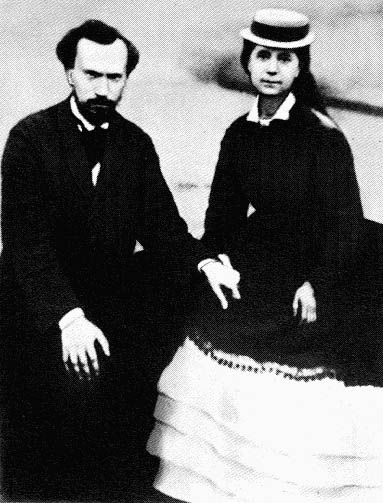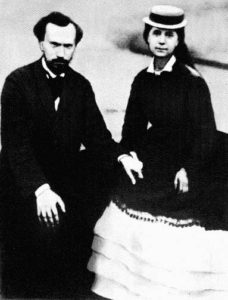Paul Lafargue (January 15, 1842 – November 26, 1911) was a Cuban-French revolutionary Marxist socialist journalist, literary critic, political writer and activist; he was Karl Marx’s son-in-law, having married his second daughter Laura.
Lafargue was born in Santiago de Cuba to French and Creole parents. His father was the owner of coffee plantations in Cuba, and the family’s wealth allowed Lafargue to study in Santiago and then in France. In 1851, the Lafargue family moved back to its hometown of Bordeaux, where Paul attended secondary school. Later he studied medicine in Paris.
After the revolutionary episode of the Paris Commune in 1871, political repression forced him to flee to Spain. He finally settled in Madrid, where he contacted those local members of the International over whom his influence was going to be very important.
The task given to Lafargue consisted mainly of gathering a Marxist leadership in Madrid, while exercising an ideological influence through unsigned articles in the newspaper La Emancipación (where he defended the need to create a political party of the working class, one of the main topics opposed by the anarchists). At the same time, Lafargue took initiative through some of his articles, expressing his own ideas about a radical reduction of the working day (a concept which was not entirely alien to the original thought of Marx).
Unlike in other parts of Europe where Marxism came to play a dominant part, Spain’s revolutionaries were mostly followers of the International’s anarchist faction (they were to remain very strong up until the Spanish Civil War of the 1930s, and the subsequent dictatorship). Lafargue became involved in redirecting the trend toward Marxism, an activity that was largely developed under directions from Friedrich Engels, and one that became intertwined with the struggles that both tendencies had at the international level – as the Spanish federation of the International was one of the main pillars of the Anarchist group.
Lafargue was the subject of a famous quotation by Karl Marx. Shortly before Marx died in 1883, he wrote a letter to Lafargue and the French Workers’ Party leader Jules Guesde, both of whom already claimed to represent “Marxist” principles. Marx accused them of “revolutionary phrase-mongering” and of denying the value of reformist struggles. This exchange is the source of Marx’s remark, reported by Friedrich Engels: “ce qu’il y a de certain c’est que moi, je ne suis pas Marxiste” (“what is certain to me is that [,if they are Marxists, then] I am not [a] Marxist”).
Lafargue was an influential speaker and wrote numerous works on revolutionary Marxism, including the humorous and well-known, “The Right to Be Lazy” and “Evolution and Property”. By age 70, in 1911, the elderly couple commit suicide together, having decided they had nothing left to give to the movement to which they devoted their lives.
Agencies/Wiki/various/Internet Photos/Arnoldo Varona/Thecubanhistory.com
THE CUBAN HISTORY, HOLLYWOOD.
PAUL LAFARGUE, PERIODISTA, ACTIVISTA. (Nacido en Santiago de Cuba).
Paul Lafargue (15 enero 1842 – 26 noviembre 1911) fue un cubano-francés, periodista, revolucionario marxista, socialista, crítico literario, escritor y activista político, Karl Marx fue su suegro, habiéndose casado con su segunda hija Laura.
Lafargue nació en Santiago de Cuba de padres franceses y criollos. Su padre era el propietario de las plantaciones de café en Cuba, y la riqueza de la familia permitió Lafargue a estudiar a Santiago y luego en Francia. En 1851, la familia Lafargue se mudó de nuevo a su ciudad natal de Burdeos, donde Pablo asistió a la escuela secundaria. Más tarde estudió medicina en París.
Después del episodio revolucionario de la Comuna de París en 1871, la represión política lo obligó a huir a España. Finalmente se estableció en Madrid, donde contactó con los miembros locales de la Internacional sobre los que su influencia iba a ser muy importante.
La tarea encomendada a Lafargue consistía principalmente en reunir una dirección marxista en Madrid, en el ejercicio de una influencia ideológica a través de artículos sin firma en el diario La Emancipación (donde defendió la necesidad de crear un partido político de la clase obrera, uno de los temas principales opuestas por los anarquistas). Al mismo tiempo, Lafargue tomó la iniciativa a través de algunos de sus artículos, expresando sus propias ideas acerca de una reducción radical de la jornada de trabajo (concepto que no era del todo ajeno al pensamiento original de Marx).
Al contrario que en otras partes de Europa, donde el marxismo llegó a desempeñar un papel dominante, los revolucionarios españoles eran en su mayoría seguidores de la facción anarquista de la Internacional (estaban siendo muy fuerte hasta la Guerra Civil Española de 1930, y la posterior dictadura). Lafargue se involucró en la reorientación de la tendencia hacia el marxismo, una actividad que se ha desarrollado en gran parte bajo las direcciones de Friedrich Engels, y uno que se entrelazaron con las luchas que ambas tendencias tenido a nivel internacional – como la federación española de la Internacional fue uno de los pilares principales del grupo anarquista.
Lafargue era el tema de una famosa cita de Karl Marx. Poco antes de la muerte de Marx en 1883, escribió una carta a Lafargue y los trabajadores de Francia El líder del Partido Jules Guesde, ambos de los cuales ya se decía representar “marxistas” principios. Marx les acusó de “frase revolucionaria” y de negar el valor de las luchas reformistas. Este intercambio es la fuente de la observación de Marx, reportado por Friedrich Engels: “ce qu’il ya de cierta c’est Que moi, je ne suis pas Marxiste” (“lo que es cierto para mí es que [si son marxistas, entonces] yo no soy marxista “).
Lafargue era un orador influyente y escribió numerosas obras sobre el marxismo revolucionario, incluyendo el humor y conocido, “El derecho a la pereza” y “Evolución y Propiedad”. A la edad de 70 años, en 1911, la pareja de ancianos se suicidan juntos, teniendo decidieron que no tenía nada que dar al movimiento al que dedicaron sus vidas.
Agencies/Wiki/various/Internet Photos/Arnoldo Varona/Thecubanhistory.com
THE CUBAN HISTORY, HOLLYWOOD.











